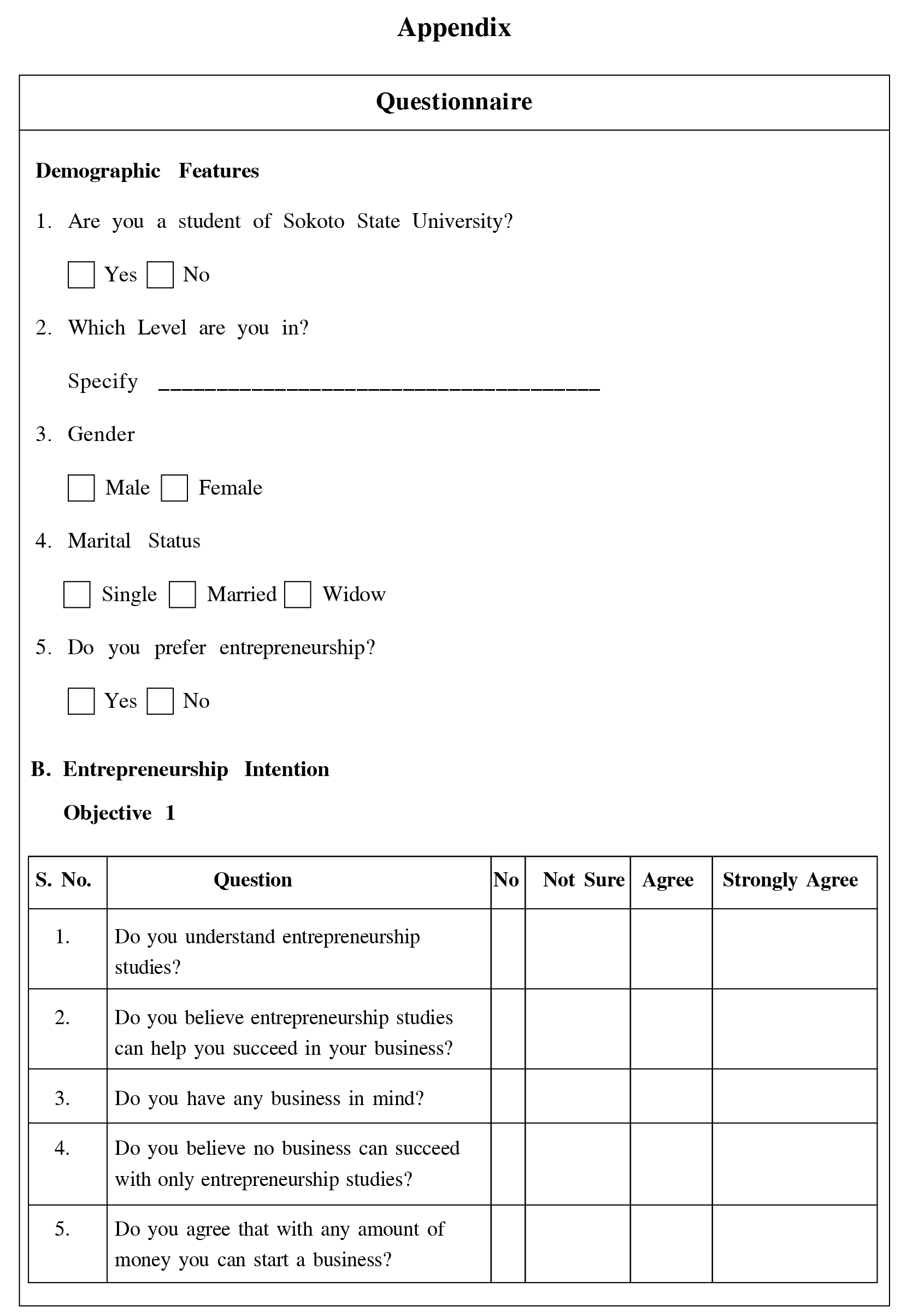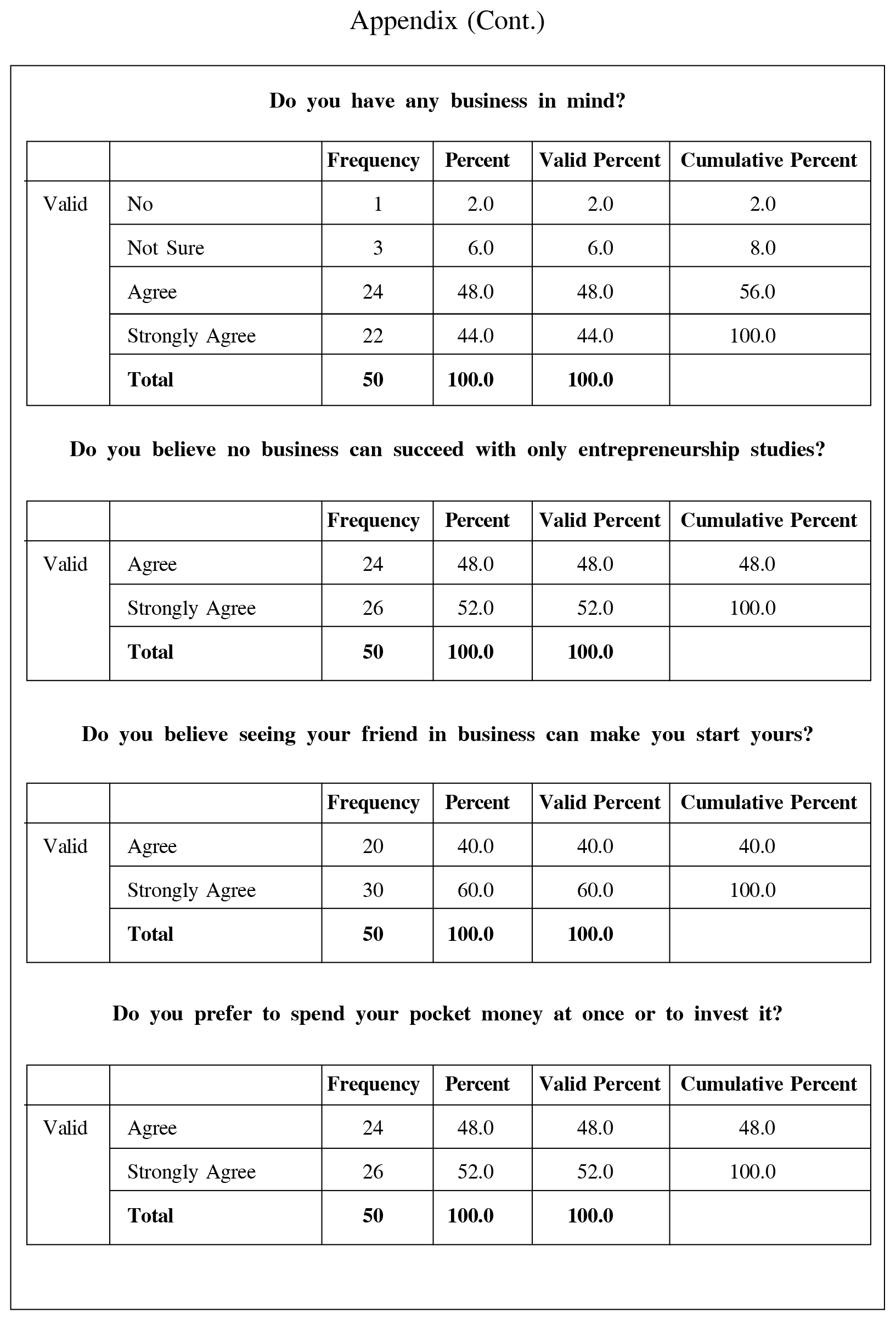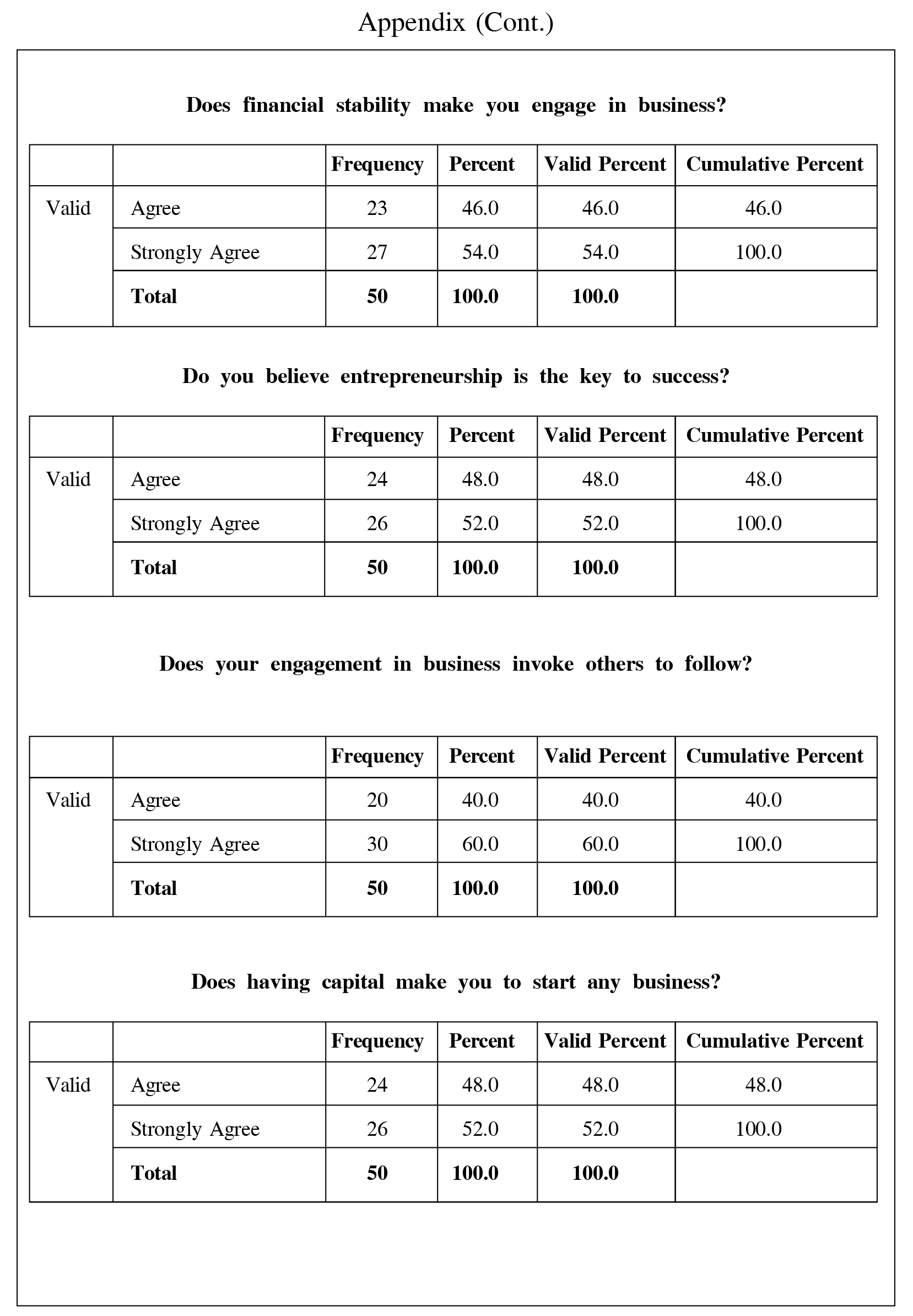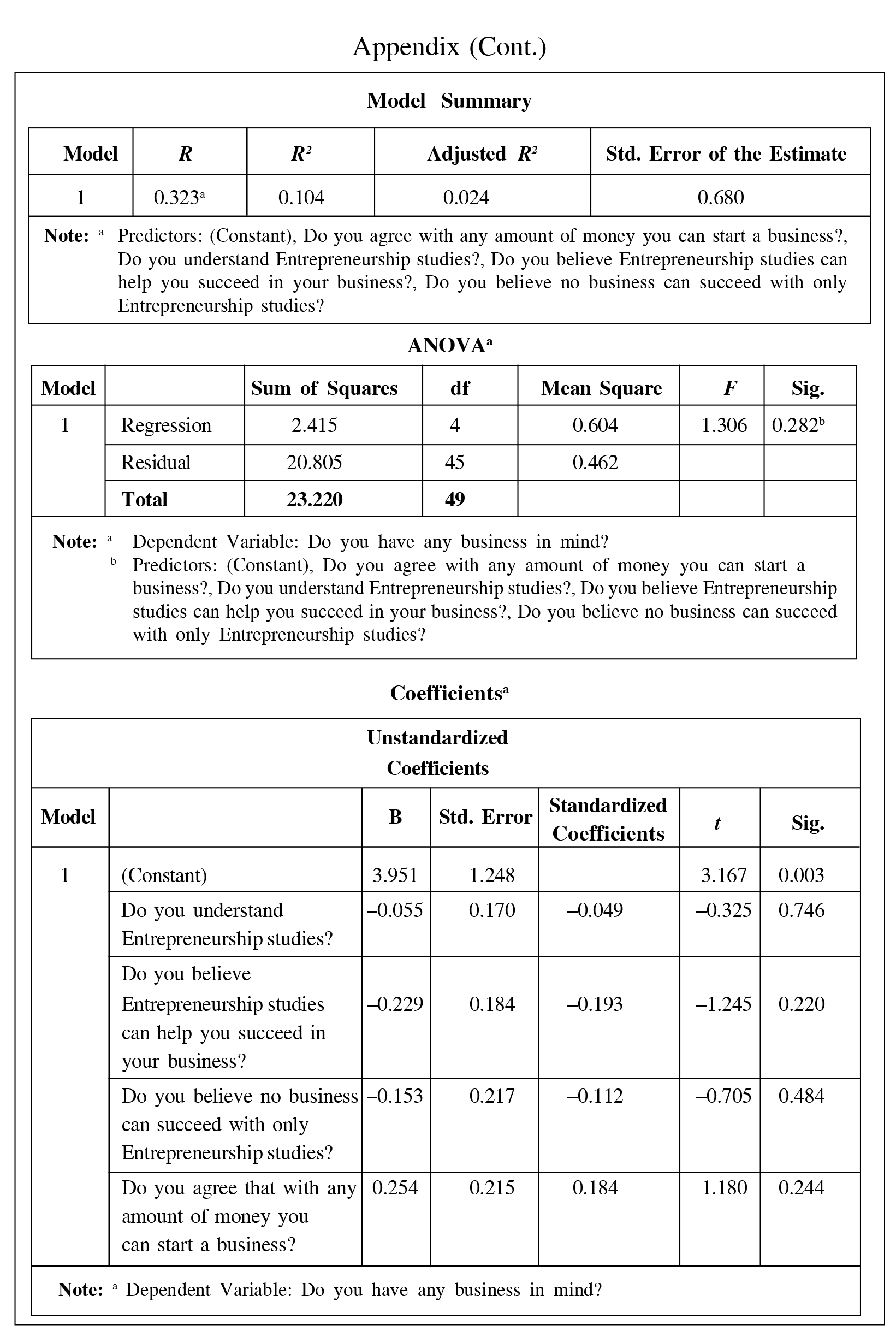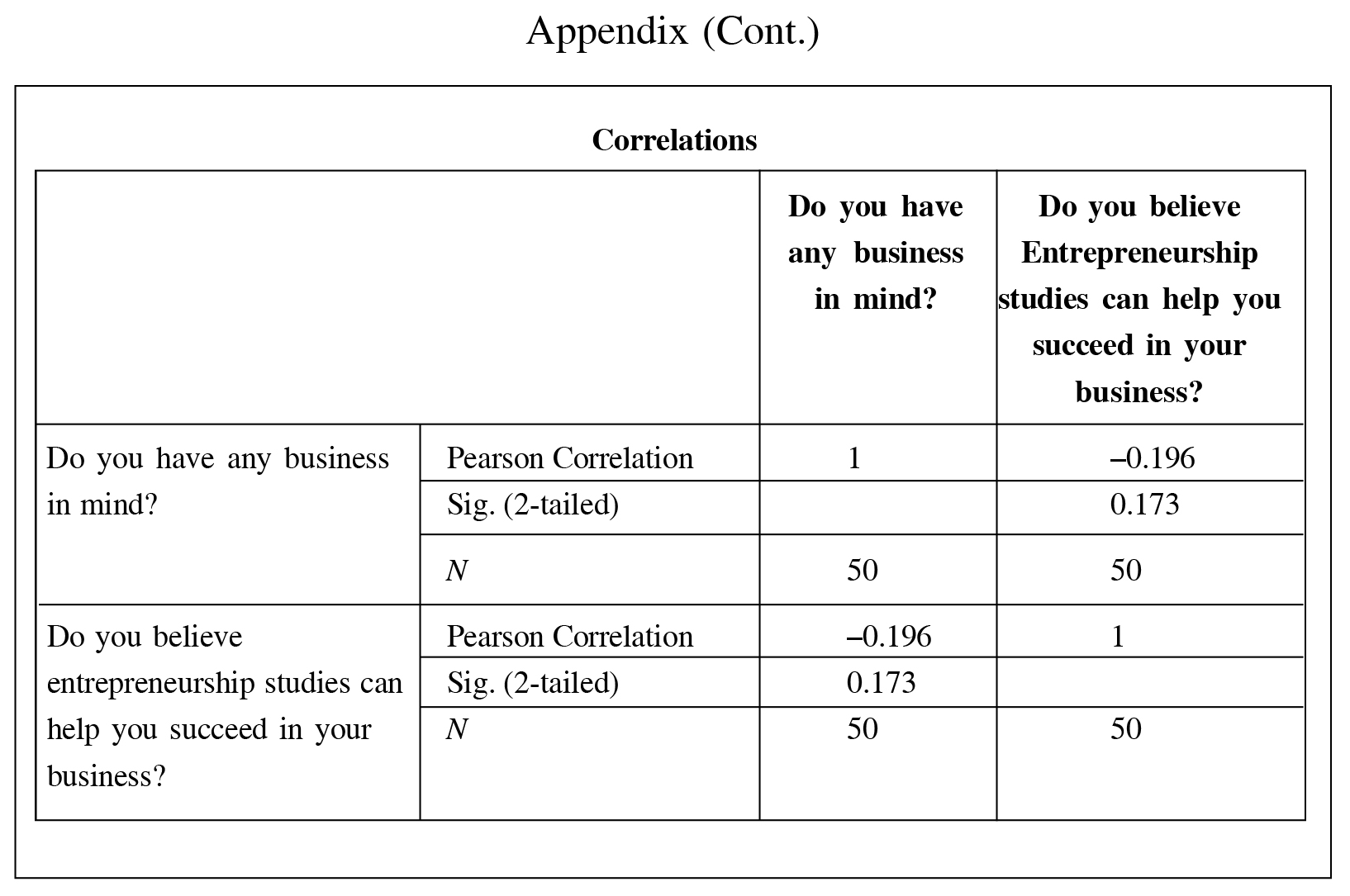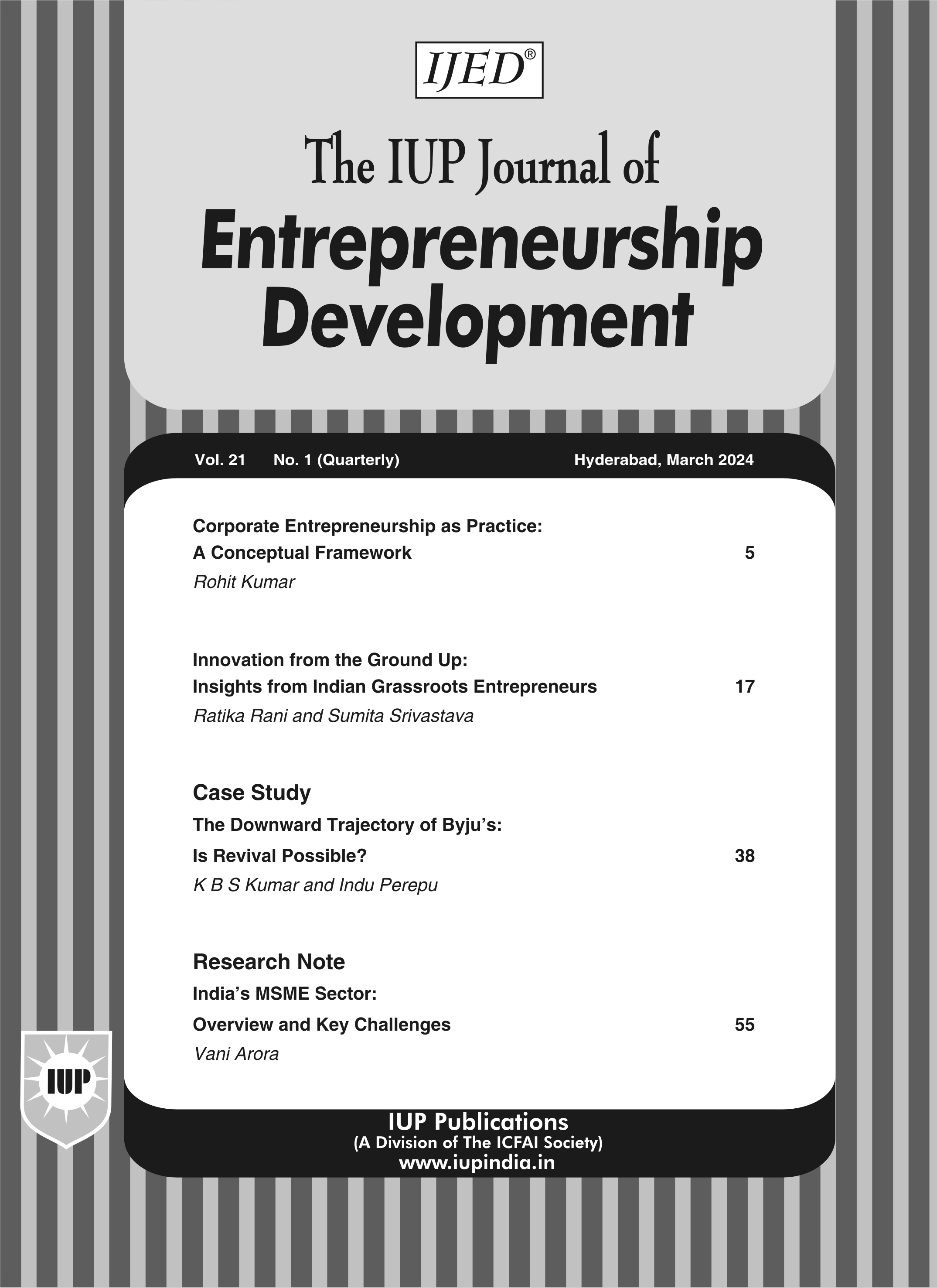
June'22
The IUP Journal of Entrepreneurship Development
Archives
Impact of Entrepreneurial Education on Entrepreneurial Intention Among Sokoto State University Students
Basiru Haliru
Faculty of Arts and Social Sciences, Department of Economics, Sokoto State University, Nigeria.
E-mail: Basiru.haliru@ssu.edu.ng
TThe study assesses the impact of entrepreneurial education on the entrepreneurial intention among Sokoto State University students. The study adopts survey research design, using a structured questionnaire that was administered to 50 students. The techniques of analysis employed are descriptive and inferential statistics; regression and Pearson correlation. The results of the analysis reveal that entrepreneurship studies have a negative effect on entrepreneurial intentions, while correlation results reveal the negative relationship between entrepreneurial studies and entrepreneurial intentions. The findings of the study recommend that there is a need to make entrepreneurial studies and skills more effective, which will help develop strong entrepreneurial intention among the students of Sokoto State University.
Introduction
In developing countries, entrepreneurship is considered vital for increasing employment opportunities. This impact of entrepreneurship is also evident from territories which reported a decline in the unemployment levels because they have higher level of entrepreneurial initiative indexes (Audretsch, 2002). In spite of such global recognition, entrepreneurship remains limited in Nigeria. This happens due to limited attention of policymakers and government towards entrepreneurship in the past, and lower level of growth in key indicators for starting new businesses and limited economy to absorb shocks (Haque, 2007). Entrepreneurship education has been recognized as one of the important determinants of entrepreneurial intentions. Various studies like Galloway and Brown (2002), Fayolle et al. (2006), Potter (2008), Henderson and Robertson (2000), Di and Swanson (2013) empirically demonstrated entrepreneurial education as an important determinant of entrepreneurial intentions. Although the importance of entrepreneurship education has been recognized in the literature, limited empirical studies have been conducted to analyze the impact on entrepreneurial intention separately from general education (Peterman and Kennedy, 2003).
As mentioned by Byabashaija and Katono (2011, p. 129), "The effect of general education has been explored but only a few studies have looked at entrepreneurial education, particularly at university and tertiary institution level." According to Byabashaija and Katono (2011), the effect of entrepreneurship education on entrepreneurial intention is limited and still undergoing empirical testing. In their study, Di and Swanson (2013) concluded that despite the importance of entrepreneurship education, it is unusual to observe that few studies have been conducted to see the impact of entrepreneurship education on intention. Di and Swanson (2013) found, based on a survey of the literature on entrepreneurial intentions that limited studies conducted at tertiary institutes in Nigeria. Only few studies have been conducted to analyze the effect of entrepreneurship education on entrepreneurship intentions of individuals in Nigeria. The limited research demonstrated empirically, the impact of different components taught in entrepreneurial courses on entrepreneurial intentions. The purpose of this study is to analyze the impact of entrepreneurship education on intentions of the students studying in Sokoto State University, Sokoto, Nigeria.
Literature Review
Theoretical Framework
According to Shane (2003), entrepreneurship process consists of capability to identify opportunity, collect resources, organize them and adopt strategy so that the opportunity can be exploited. The knowledge, skills and information obtained through education will likely improve the ability to exploit the opportunity. Entrepreneurship education not only improves knowledge, skill and information needed to pursue an opportunity but also equips individuals with analytical ability and knowledge of entrepreneurial process which improve entrepreneurial judgment (McMullen and Shepherd, 2006). A study by European Commission (2006) reported that entrepreneurship-specific education encourages students in accumulating entrepreneurial intentions which results in creation of new firms by the students. Researchers agreed that the influence of "push" and "pull" while studying entrepreneurship may determine their entrepreneurial career path (Matlay and Storey, 2003). Galloway and Brown (2002) and Henderson and Robertson (2000) in their studies also showed linkages between entrepreneurial education and entrepreneurial activity of students. The study by Potter (2008) highlighted that the function of entrepreneurship education is vital in enhancing the entrepreneurship attitudes of individuals at tertiary level of education. Therefore, entrepreneurship education initiatives at university level are considered vital for increasing potential entrepreneur supply by making more students conscious of and interested in choosing entrepreneurship as a career option. Accordingly, entrepreneurship education in the form of courses is correlated to entrepreneurial intentions for three reasons. First, entrepreneurship education helps the students to learn and identify new business opportunities.
Such knowledge leads to enhanced innovativeness and opportunities which are linked with technology (Shepherd and DeTienne, 2005). Learning important entrepreneurial skills and competencies will lead to new feasible ventures by students, thus affecting Perceived Behavioral Control (PBC) (Krueger et al., 2000; Zhao et al., 2005). Second, research also found a positive association between social desirability and entrepreneurship career intention (Tkachev and Kolvereid, 1999). While the important role of education is taken into account when individuals opt for entrepreneurial careers (Krueger and Brazeal, 1994) which can form attitude toward behaviors and social norms. Third, through entrepreneurship courses, one gets knowledge about starting new business ventures in a better and faster way that results in more value (Zhao et al., 2005; Davidsson and Honig, 2003).
The results of different empirical studies have confirmed that PBC, attitude and social norms are the major factors for explaining entrepreneurial intention (Autio et al., 2001; Kolvereid, 1996; Krueger and Carsrud, 1993; Linan and Chen, 2009; and Linan et al., 2011). Due to this reason, it is argued that for motivating entrepreneurship intention through entrepreneurship education, these elements should be considered. those elements. In their study, Di and Swanson (2013) not only empirically demonstrated the impact of entrepreneurship education on entrepreneurship intention but also showed that entrepreneurship education directly impacts entrepreneurship intention. This conclusion refutes the prevailing perspective that assumes that entrepreneurship education indirectly affects entrepreneurship intentions. The study also suggested further research on the relationship between entrepreneurship education and intentions, especially from developing countries context because there is little research from that perspective. In their study, Oosterbeek et al. (2010) confirmed the negative impact of entrepreneurship education on entrepreneurship intentions. They also reported that hte impact of entrepreneurship education on entrepreneurial skills/traits was significantly zero or negative. They argued that such results may be linked to the fact that during entrepreneurship education, students have acquired "realistic perspectives" about themselves and what is required to be an entrepreneur. Von et al. (2010) found that the effect of entrepreneurship education on entrepreneurial intentions decreased to a certain extent, even though the entrepreneurship course has significantly positive impact on students' entrepreneurial skills. Lorz et al.
(2011), in their Meta-analysis of impact studies and applied methodologies of entrepreneurship education, suggested mainly three reasons for such confusing results on the impact of entrepreneurship education on intentions: first, in the method used, for example, small sample and cross-section design, lack of ex-ante/ex-post and control group; second, a variety of different entrepreneurship programs as independent variable; and third, variation in participant levels. Nevertheless, there is still limited agreement on the variables which form the basis of individual decision of starting a new venture. A majority of studies on entrepreneurial education and intentions focused on the general impact of entrepreneurial education on intention and measured the entrepreneurship intention before or after entrepreneurship course or program (Lo et al, 2011). This may be because as Neck et al. (2014) said, "Our purpose was to acknowledge that we teach in several different worlds. Many teach in more than one world, but the environment for entrepreneurship is changing, whereas education for entrepreneurship is not". This suggests the need for more empirical studies to understand the various factors that impact entrepreneurial intentions when individuals get entrepreneurship education. The university education on entrepreneurship initially focused on the know-what, i.e., basic definitions and concepts of business knowledge, management and entrepreneurship (Johannisson, 1991), which describes the theoretical aspect of entrepreneurship. Moreover, the know-who component enhances students' networking at societal level by developing interaction with different entrepreneurs such as businesspersons, entrepreneurial role models, professors, and classmates (Johannisson, 1991).
Objectives
1. To examine the educational factors that determine entrepreneurial intentions among Sokoto State University students.
2. To evaluate the attitude factors that determine entrepreneurial intentions among Sokoto State University students.
3. To investigate the relationship between entrepreneurial studies and entrepreneurial intentions among Sokoto State University students.
Definitions and Theories of Entrepreneurship
This section defines the term and examines the pertinent theories and models for establishing the theoretical framework.
The term 'entrepreneur' is derived from a French word entreprendre, which means to undertake. An entrepreneur could be an innovator or developer who recognizes and seizes opportunities, converts those opportunities into workable and marketable ideas, adds value through time, effort, money or skills, and realizes rewards from these efforts. Basically, an entrepreneur is one who undertakes to organize, manage and assume the risks of a business (Kuratko and Hodgetts 2004, pp. 28-29).
Many studies defined entrepreneurship in two fundamental ways which highlighted a dichotomy. First, it was explained as a property or quality of the firm. Entrepreneurial firms were thought of as small (Aldrich and Austen, 1986), fast-growing, organic and network-based, rather than mechanistic or bureaucratic (Birley, 1986).
The distinctions in the definitions clearly show that entrepreneurial firms had advantage compared to other forms of organizations. Secondly, entrepreneurial firms were thought of as more innovative (Backman, 1983), flexible and adaptable (Birch, 1987). The term entrepreneurship included a behavioral characteristic of employers and managers in the firm and not a characteristic of the firm itself. Entrepreneurial people took advantage of opportunities to acquire added value for themselves or for the firm. It championed the idea of corporate entrepreneurship (Burgelman, 1983). Firms could maintain entrepreneurial advantage by instilling a culture that forces entrepreneurial behavior among the managers and employees in a firm (Kanter, 1983), thus creating an entrepreneurial spirit among its members (Rengiah, 2013). As innovators and developers, entrepreneurs identified and exploited opportunities (Peterson, 1985), and this was further explained by Thompson (2009), that entrepreneurs want to realize new opportunities and are willing to be able to act on it.
Entrepreneurship was defined as the result of creating new business opportunities (Levie 1999), and they could be later converted into marketable products and services.
The term was further defined by Reynolds (1999) as an attempt of new business or new venture creation, such as self-employment, a new business organization, or the expansion of an existing business by an individual, a team of individuals, or an established business. An entrepreneur was classified as "a person who creates a new business, but faces risk and uncertainty for the purpose of achieving profit and growth, by identifying the opportunities and assembling the resources to capitalize on them" (Zimmerer and Scarborough, 2002, p.
4). Hisrich et al. (2007) summarized the earlier definition and stated that entrepreneurship is the process of creating something new with the assumption of risk and rewards. Sorenson (2007) looked at a more innovative perspective and suggested that entrepreneurship is associated with innovation and management dynamics.
Based on the various definitions proposed by the researchers and scholars, entrepreneurship could be defined as a dynamic process of vision, change and creation. It requires an application of energy and passion towards creation and implementation of new ideas and creative solutions. It includes the willingness to take risks, to formulate an effective venture team, the creative skill to marshal the needed resources, the fundamental skill of building a solid business plan, and finally the ability to recognize the opportunity where others see only chaos, contradiction and confusion (Kuratko and Audretsch, 2009, p.5).
Methodology
To achieve objective 1, the following will be used:
The package for analysis is SPSS 23.
The tools of analysis are descriptive statistics and inferential statistics, i.e., Linear Multiple Regression.
H1: The educational factor has no influence on entrepreneurial intention among Sokoto State University students.
H2: The educational factor has influence on entrepreneurial intention among Sokoto State University students.
The population of the study will cover 50 students who were offered entrepreneurial courses (both study and skills).
The variables under study are demographic profile, knowledge, experience and entrepreneurship intention.
Y1 = X0 + B1X1 + B2X2 ... BNXN
Y2 = R0 + B1R1 + B2R2 ... BNRN
The above is the sample of our Model for the analysis.
To achieve objective 2, the following will be used:
The package for analysis is SPSS 23.
The tools of analysis are descriptive statistics, i.e., percentages, ratios, frequencies, range, mean, median, variance and standard deviation.
The population of the study will cover 50 students who were offered entrepreneurial course (both study and skills).
The variables under study are demographic profile, attitude factor, social norms and entrepreneurship intention.
H1: Attitude factor can not determine entrepreneurial intention among Sokoto State University students.
H2: Attitude factor can determine entrepreneurial intention among Sokoto State University students.
To achieve objective 3, the following will be used:
The package for analysis is SPSS 23
The tools of analysis are descriptive statistics, i.e., percentages, ratios, frequencies, range, mean, median, variance and standard deviation. The inferential statistics, i.e., parametric, pearson correlation.
H1: Entrepreneurial studies have no relationship with the entrepreneurial intention among Sokoto State University students.
H2: Entrepreneurial studies has relationship with the entrepreneurial intention among Sokoto State University students.
The variables under study are demographic profile, entrepreneurial studies, knowledge and entrepreneurial intention. The sample of the Model for correlation is:

This study adopted survey research design through the use of questionnaire (see Appendix).
The questionnaire was administered to 50 students who were offered entrepreneurial courses at Sokoto State university.
Results and Discussion
Table 1 describes the nature of the survey conducted for the course of the study.
Table 2 presents descriptive statistics results on attitude factor, social norms and entrepreneurship intention.
The results reveal that seeing your friend in business or activity can make you start yours has a mean value of (3.60) with standard deviation of (0.495); spending pocket money or investing them has a mean value of (3.52) with standard deviation of (0.505); investing pocket money helps you get financial stability has a mean value of (3.64) with standard
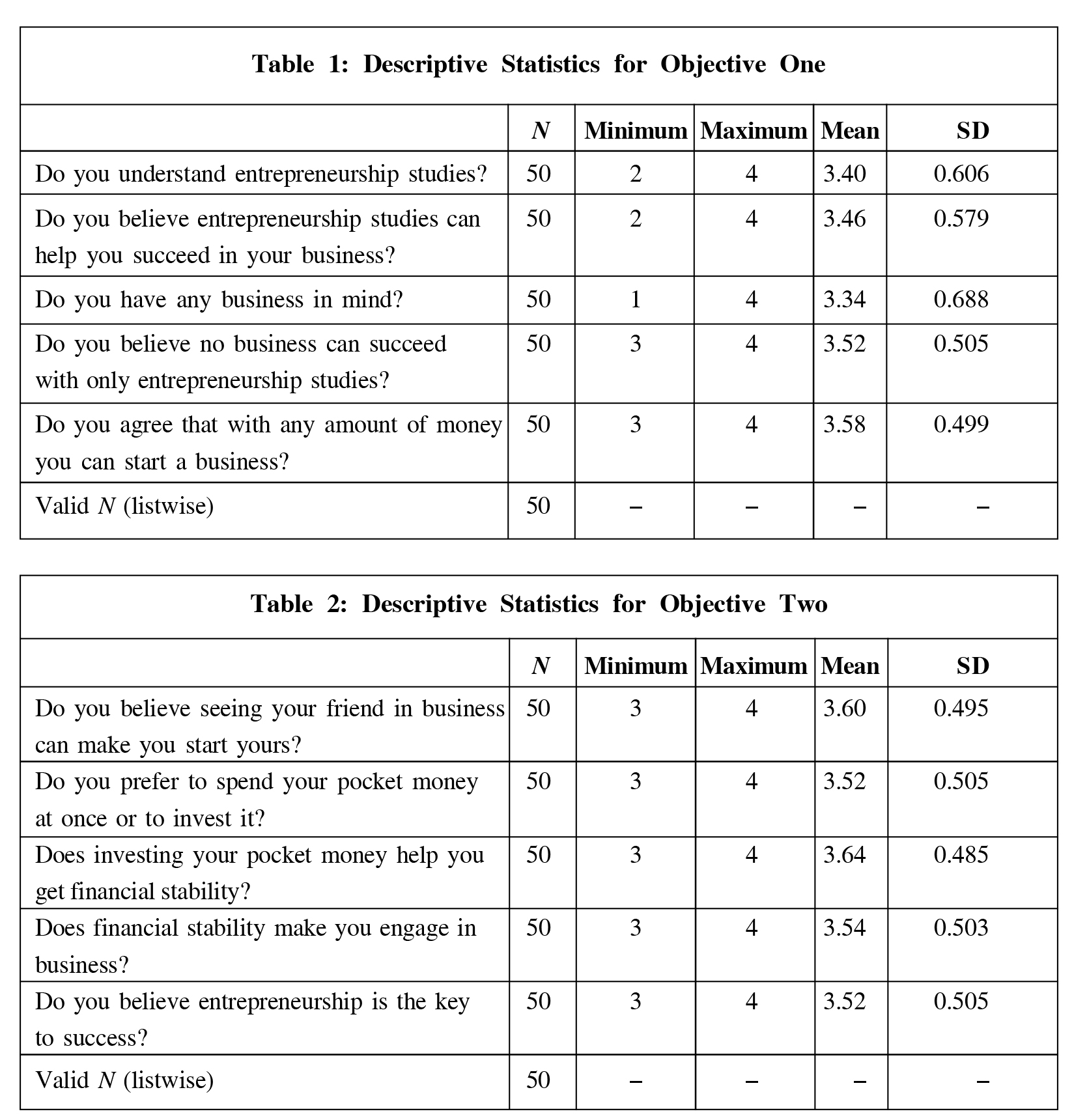
deviation of (0.485); does financial stability make you engage in business has a mean value of (3.54) with standard deviation of (0.503); lastly, do you believe entrepreneurship is the key to success has a mean value of (3.52) with standard deviation of (0.505). To sum up, the table reveals that attitude factor can determine entrepreneurial intention among Sokoto State University students.
Table 3 shows the descriptive statistics of Objective 3. The results show does knowledge of entrepreneurship make you start your own business has a mean value of (3.56) with standard deviation of (0.501); does your engagement in business invoke others to follow has a mean value of (3.60) with standard deviation of (0.495); does having capital make you
start your own business has a mean value of (3.52) with standard deviation of (0.505); do you believe no business can be started without capital despite one's zeal has a mean value of
(3.48) with standard deviation of (0.505). The table reveales effective entrepreneurial
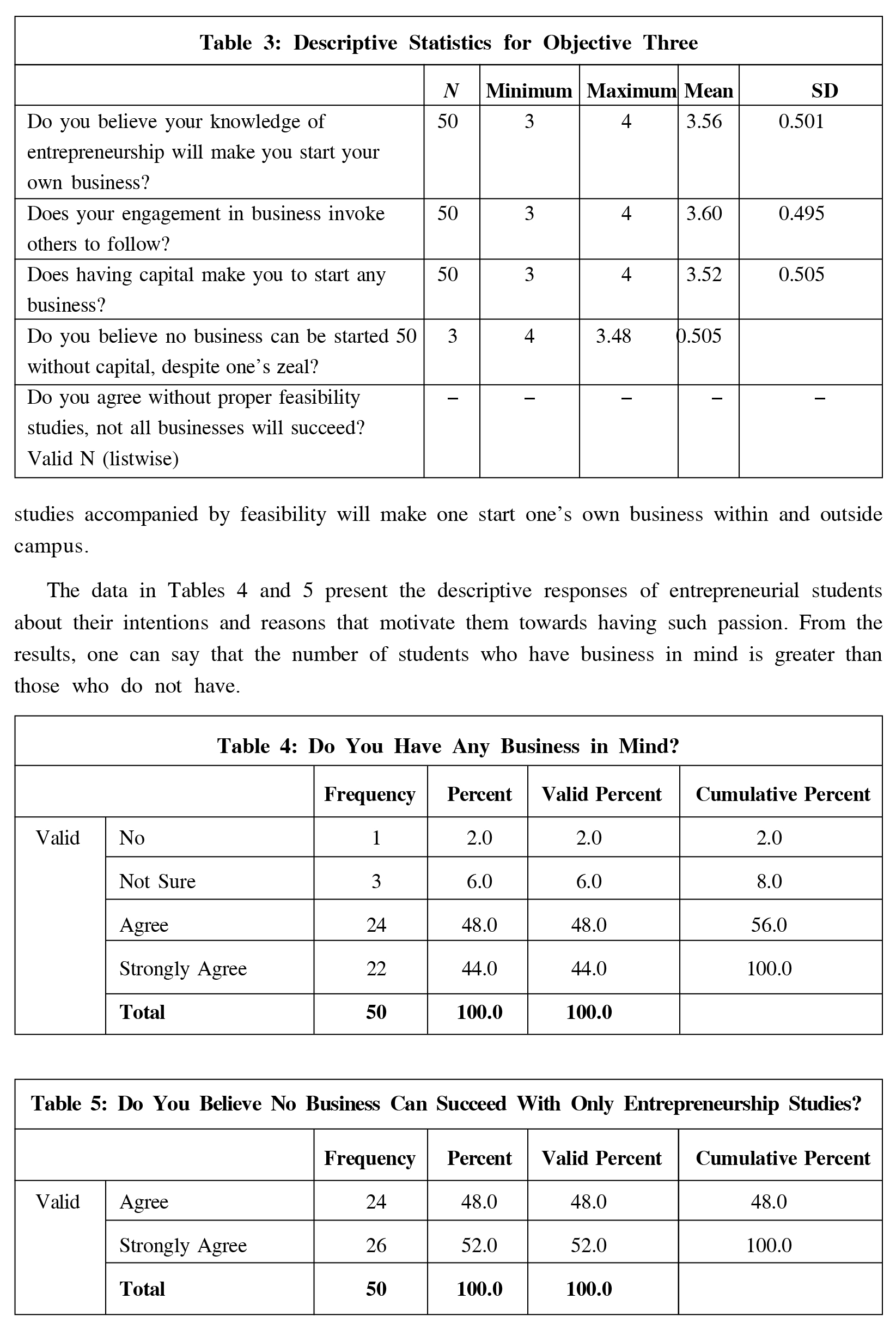
The regression results in Table 6 show the magnitude of influence of entrepreneurial studies on Sokoto State University students' entrepreneurial intention. X1, which represents entrepreneurship studies, has a negative effect on entrepreneurial intention with a coefficient of (-0.049) but not significant even at 10% level of significance. X2, which represents entrepreneurial studies can help you succeed in business has a negative effect on entrepreneurial intention but not significant even at 10% level of significance has coefficient of (-0.193); X3, which represents business can succeed with only entrepreneurial studies has a negative effect on entrepreneurial intention but not significant even at 10% level of significance with coefficient of (-0.112); while X4, which stands for that with any amount of money you can start a business has a positive effect on entrepreneurship intention but not significance even at 10% level of significance with coefficient of (0.184). The summary of regression showed R2 with value of (0.104), which shows 10.4% of influence was captured by endogenous variables in the model, while the remaining 89.6% of influence was captured by exogenous variables. The overall regression is represented by F-stat. with value of (1.306) which is not significant even at 10%. To conclude, the entire regression is feasible.
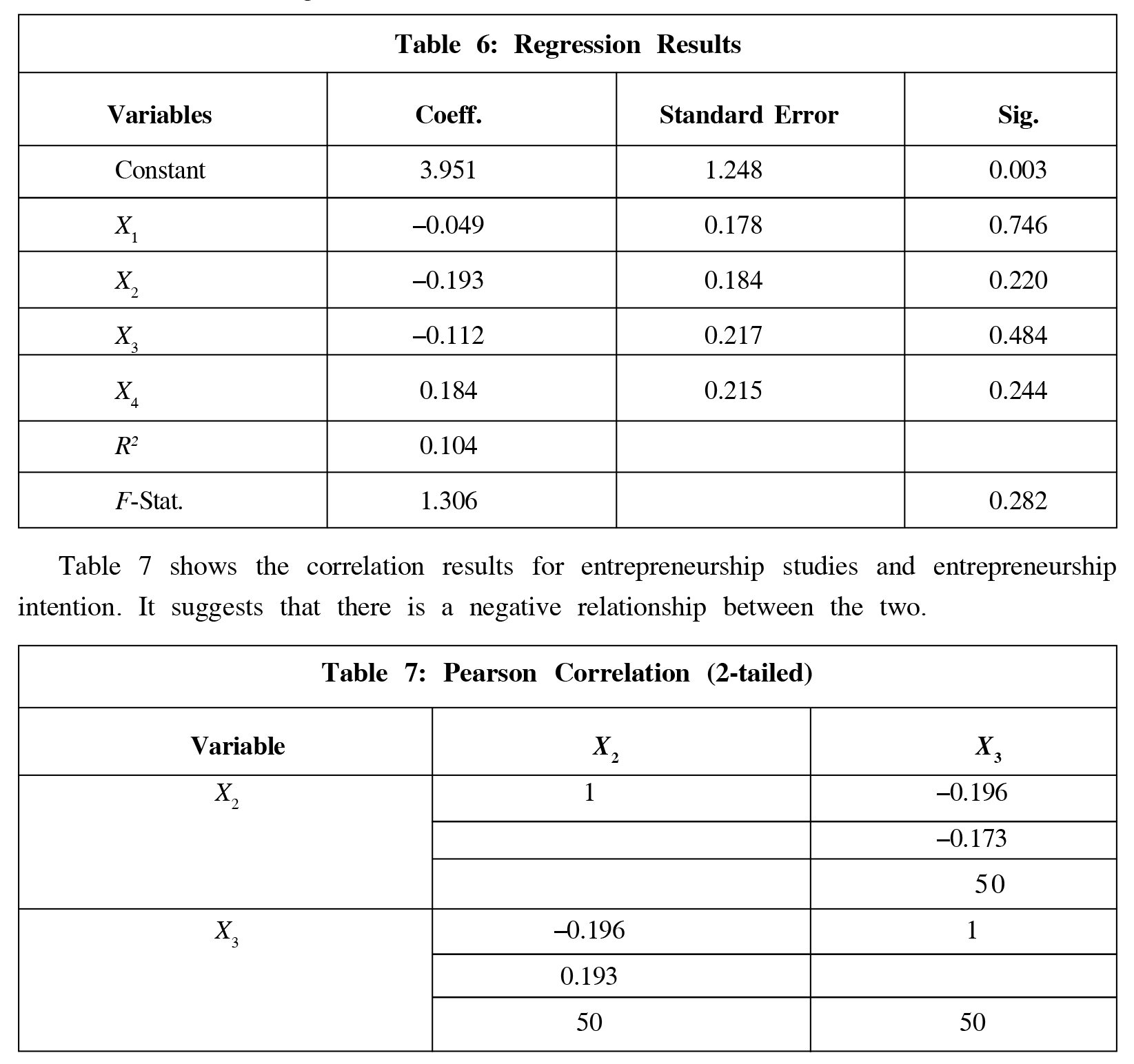
Objective 1
Decision: Failed to reject H1 and it is concluded that educational factor has influence on entrepreneurial intention among Sokoto State University Students.
Objective 2
The factors that determine entrepreneurial intention based on the study are; seeing a friend in business, savings and entrepreneurship believe are to be the key towards nurturing entrepreneurial intention among student's in Sokoto state university.
Objective 3
Decision 2 failed to reject H1 and it is conclude that entrepreneurial studies have a negative significant relationship with entrepreneurial intention among Sokoto State university students.
Conclusion
The aim of this study is to analyze the impact of entrepreneurial education on entrepreneurial intention among Sokoto state university students. The study adopted the theory of planned Behavior, which support that human intention, attitude or behaviors are influence by their attitude and belief. Many scholars have adopted this theory to provide vivid explanation about connection between entrepreneurship education and entrepreneurship intention such as (Sylvia and Dayang 2016 and Israr and Saleem, 2018) they have all make use of the theory to support their studies. From Table 1. The result showed that intention to start any business or entrepreneurial initiative is control by your level of education on entrepreneurship studies and available capital you have can make you to have entrepreneurial intention. Likewise, (Solesvik, 2013) found that the student's participated in entrepreneurial education had high perceived entrepreneurial motivation than student who didn't study entrepreneurial course.
While from Table 2, the description revealed that seeing a friend in business, saving pocket money and entrepreneurship believe considered to be the key towards nurturing entrepreneurship intention among Sokoto state university students.in was further supported by the finding of (Falck et al., 2012) having entrepreneurial peer group has a positive effect on an individual's entrepreneurial intention. Its further confirmed by the findings of (Yang et al., 2021) peer (friends) effects significantly improve the student intention to participate in entrepreneurship and innovation activities. Finding from Table 3, showed that feasible study on entrepreneurship will make you to start any kind business or venture. Entrepreneurship intention should derive from feasibility and desirability perception plus a propensity to act on opportunities (Krueger, 1993).
Entrepreneurial intention can be determined by considering entrepreneurial studies, availability of capital (money) can make excel in any opportunity (Table 6). Entrepreneurial education has a positive influence on entrepreneurial intention among the student of a college student (Hussain and Norashidah, 2015). From the regression result the finding revealed that there is negative effect between entrepreneurial studies and entrepreneurial intention. Entrepreneurship education found to be insignificant on entrepreneurship intention (Michael et al., 2011). Entrepreneurship education has a positive influence on the students' entrepreneurial intentions (Kuehn, 2008). The result in the correlation analysis found that entrepreneurial studies have a negative significant relationship with entrepreneurial intention among Sokoto State university students. The relationship between entrepreneurship education and post-education entrepreneurial intention was not significant (Ceresia, 2018).
Based on the study, it is understood that education is the key to unlocking the potential towards entrepreneurship. Many studies have arrived at towards similar findings, but they all differ in techniques and methodology. Despite the insignificant found in the literature and of course in the study between entrepreneurial education and entrepreneurial intention. The result found in the analysis for both regression and correlation they were all having negative influence between the two competing variables of the study. Many scholars in the literature have observed that in their studies like (Michael et al., 2011; and Hussain and Norashidah, 2015).
The findings recommend the following: there is a need for making entrepreneurial studies and skills more effective to develop strong entrepreneurship intention among the students; and the government should encourage imparting entrepreneurship education in institutions of learning and thus help inculcate the habit of self-reliance among the students.
References
- Aldrich H E and Austen W G (1986), "Entrepreneurship, Theory and Practice", Applied Financial Economics, Vol. 8, No. 2, pp. 34-45.
- Audretsch D B (2002), "The Dynamic Role of Small Firms: Evidence from the US", Small Business Economics, Vol. 18, No.1, pp. 13-40.
- Autio E, Keeley R H, Klofsten M, Parker G G C and Hay M (2001), "Entrepreneurial Intent Among Students in Scandinavia and in the USA", Enterprise and Innovation Management Studies, Vol. 2, No. 2, pp. 145-160.
- Backman J (1983), Entrepreneurship and the Outlook for America, (Ed.), Free Press.
- Birch D G (1987), "Job Creation in America: How Our Smallest Companies Put the Most People to Work", University of Illinois at Urbana-Champaign's Academy for Entrepreneurial Leadership Historical Research Reference in Entrepreneurship.
- Birley S (1986), "The Role of New Firms: Births, Deaths and Job Generation", Strategic Management Journal, Vol. 7, No. 4, pp. 361-376.
- Burgelman R A (1983), "Corporate Entrepreneurship and Strategic Management: Insights From a Process Study", Management Science, Vol. 29, No. 12, pp. 1349-1364.
- Byabashaija W and Katono I (2011), "The Impact of College Entrepreneurial Education on Entrepreneurial Attitudes and Intention to Start a Business in Uganda", Journal of Developmental Entrepreneurship, Vol. 16, No. 01, pp. 127-144.
- Ceresia F (2018), "The Role of Entrepreneurship Education in Fostering Entrepreneurial Intentions and Performances: A Review of 30 Years of Research", Equidad y Desarrollo, No. 31.
- Di Zhang D and Swanson L A (2013), "Social Entrepreneurship in Nonprofit Organizations: An Empirical Investigation of the Synergy Between Social and Business Objectives", Journal of Nonprofit and Public Sector Marketing, Vol. 25, No. 1, pp. 105-125.
- Falck O, Heblich S and Luedemann E (2012), "Identity and Entrepreneurship: Do School Peers Shape Entrepreneurial Intentions?" Small Business Economics, Vol. 39, No. 1,
- 39-59.
- Fayolle A, Gailly B and Lassas-Clerc N (2006), "Assessing the Impact of Entrepreneurship Education Programmes: A New Methodology", Journal of European Industrial Training, Vol. 30, No. 9, available at DOI:10.1108/03090590610715022
- Galloway L and Brown W (2002), "Entrepreneurship Education at University: A Driver in the Creation of High Growth Firms?" Education+Training, Vol. 44, pp. 398-405.
- Haque I (2007), Rethinking Industrial Policy (No. 183), United Nations Conference on Trade and Development.
- Henderson R and Robertson M (2000), "Who Wants to be An Entrepreneur? Young Adult Attitudes to Entrepreneurship as a Career", Career Development International, Vol. 5, No. 6, pp. 279-287.
- Hisrich R, Langan-Fox J and Grant S (2007), "Entrepreneurship Research and Practice: A Call to Action for Psychology", American Psychologist, Vol. 62, No. 6, p. 575.
- Hussain A and Norashidah D (2015), "Impact of Entrepreneurial Education on Entrepreneurial Intentions of Pakistani Students", Journal of Entrepreneurship and Business Innovation, Vol. 2, No. 1, pp. 43-53.
- Israr M and Saleem M (2018), "Entrepreneurial Intentions Among University Students in Italy", Journal of Global Entrepreneurship Research, Vol. 8, No. 1, pp. 1-14.
- Johannisson B (1991), "University Training for Entrepreneurship: Swedish Approaches", Entrepreneurship and Regional Development, Vol. 3, No. 1, pp. 67-82.
- Kanter R M (1983), "Frontiers for Strategic Human Resource Planning and Management", Human Resource Management, Vol. 22, Nos.1-2, pp. 9-21.
- Kolvereid L (1996), "Prediction of Employment Status Choice Intentions", Entrepreneurship Theory and Practice, Vol. 21, No.1, pp. 47-58.
- Krueger Jr N F and Brazeal D V (1994), "Entrepreneurial Potential and Potential Entrepreneurs", Entrepreneurship Theory and Practice, Vol. 18, No. 3, pp. 91-104.
- Krueger Jr N F, Reilly M D and Carsrud A L (2000), "Competing Models of Entrepreneurial Intentions", Journal of Business Venturing, Vol. 15, Nos. 5&6, pp. 411-432.
- Krueger N (1993), "The Impact of Prior Entrepreneurial Exposure on Perceptions of New Venture Feasibility and Desirability", Entrepreneurship Theory and Practice, Vol. 18, No. 1, pp. 5-21.
- Krueger N F and Carsrud A L (1993), "Entrepreneurial Intentions: Applying the Theory of Planned Behaviour", Entrepreneurship & Regional Development, Vol. 5, No. 4, pp. 315-330.
- Kuehn K W (2008), "Entrepreneurial Intentions Research: Implications for Entrepreneurship Education", Journal of Entrepreneurship Education, Vol. 11, p. 87.
- Kuratko D F and Audretsch D B (2009), "Strategic Entrepreneurship: Exploring Different Perspectives of an Emerging Concept", Entrepreneurship Theory and Practice, Vol. 33, No. 1, pp. 1-17.
- Kuratko D F and Hodgetts R M (2004), Entrepreneurship: Theory, Process, Practice, South-Western College Publishers, Mason, OH.
- Kuratko D F, Morris M H and Schindehutte M (2015), "Understanding the Dynamics of Entrepreneurship Through Framework Approaches", Small Business Economics, Vol. 45, No. 1, pp. 1-13.
- Levie J (1999), Entrepreneurship Education in Higher Education in England: A Survey, Department for Education and Employment, London.
- Linan F and Chen Y W (2009), "Development and Cross-Cultural Application of a Specific Instrument to Measure Entrepreneurial Intentions", Entrepreneurship Theory and Practice, Vol. 33, No. 3, pp. 593-617.
- Linan F, Rodriguez-Cohard J C and Rueda-Cantuche J M (2011), "Factors Affecting Entrepreneurial Intention Levels: A Role for Education", International Entrepreneurship and Management Journal, Vol. 7, No. 2, pp. 195-218.
- Lo, Andrew W and Craig MacKinlay A (2011) "A Non-Random Walk Down Wall Street", In A Non-Random Walk Down Wall Street, Princeton University Press.
- Lorz M and Volery T (2011), "The Impact of Entrepreneurship Education on Entrepreneurial Intention", University of St. Gallen.
- Matlay H and Storey D J (2003), "Should you Become an Entrepreneur? Positive and Negative Factors Affecting Individual Career Choices", Mercia Fest, Warwick University, Coventry, June.
- McMullen J S and Shepherd D A (2006), "Entrepreneurial Action and the Role of Uncertainty in the Theory of the Entrepreneur", Academy of Management Review, Vol. 31, No. 1, pp. 132-152.
- Michael L H, HOU S T and FAN H L (2011), "Creative Self? Efficacy and Innovative Behavior in a Service Setting: Optimism as a Moderator", The Journal of Creative Behavior, Vol. 45, No. 4, pp. 258-272.
- Neck H M, Greene P G and Brush C G (Eds.), (2014), Teaching Entrepreneurship: A Practice-Based Approach, Edward Elgar Publishing.
- Oosterbeek H, Van Praag M and Ijsselstein A (2010), "The Impact of Entrepreneurship Education on Entrepreneurship Skills and Motivation", European Economic Review, Vol. 54, No. 3, pp. 442-454.
- Peterman N E and Kennedy J (2003), "Enterprise Education: Influencing Students' Perceptions of Entrepreneurship", Entrepreneurship Theory and Practice, Vol. 28, No. 2, pp. 129-144.
- Potter J (2008), Entrepreneurship and Higher Education: Future Policy Directions.
- Rengiah P (2013), Effectiveness of Entrepreneurship Education in Developing Entrepreneurial Intentions Among Malaysian University Students (Doctoral Dissertation, Southern Cross University).
- Rengiah P and Sentosa I (2014), "A Conceptual Development of Entrepreneurship Education and Entrepreneurial Intentions Among Malaysian University Students", Journal of Business and Management, Vol. 16, No. 11, pp. 68-74.
- Reynolds M (1999), "Critical Reflection and Management Education: Rehabilitating Less Hierarchical Approaches", Journal of Management Education, Vol. 23, No. 5, pp. 537-553.
- Shane S A (2003), A General Theory of Entrepreneurship: The Individual-Opportunity Nexus, Edward Elgar Publishing.
- Shepherd D A and DeTienne D R (2005), "Prior Knowledge, Potential Financial Reward, and Opportunity Identification", Entrepreneurship Theory and Practice, Vol. 29, No. 1, pp. 91-112.
- Solesvik M Z (2013), "Entrepreneurial Motivations and Intentions: Investigating the Role of Education Major", Education + Training, Vol. 55, No. 3, pp. 253-271.
- Stuart T E and Sorenson O (2007), "Strategic Networks and Entrepreneurial Ventures", Strategic Entrepreneurship Journal, Vol. 1, No. 3&4, pp. 211-227.
- Sylvia N A A and Dayangh D A D (2016), "Determinants of Entrepreneurial Intention Among Undergraduate Students in Malaysia", Procedia Economics and Finance, Vol. 37, pp. 108-114.
- Thompson E R (2009), "Individual Entrepreneurial Intent: Construct Clarification and Development of an Internationally Reliable Metric", Entrepreneurship Theory and Practice, Vol. 33, No. 3, pp. 669-694.
- Tkachev A and Kolvereid L (1999), "Self-Employment Intentions Among Russian Students", Entrepreneurship & Regional Development, Vol. 11, No. 3, pp. 269-280.
- Von Graevenitz G, Harhoff D and Weber R (2010), "The Effects of Entrepreneurship Education", Journal of Economic Behavior & Organization, Vol. 76, No. 1, pp. 90-112.
- Yang L, Xiaoxu Z, Aziz N and Jun H (2021), "Do Peer Effects Influence the Intention of Students to Participate in Entrepreneurship and Innovation Activities? Evidence from Nanjing Agricultural University, China", Educational Sciences: Theory & Practice, Vol. 21, No. 2, pp. 85-100.
- Zhao H, Seibert S E and Hills G E (2005), "The Mediating Role of Self-Efficacy in the Development of Entrepreneurial Intentions", Journal of Applied Psychology, Vol. 90, No. 6, p. 1265.
- Zimmerer T W and Scarborough N (2002), Introduction to Entrepreneurship and Small Business Management, Jakarta: Prenhallindo Publisher.
